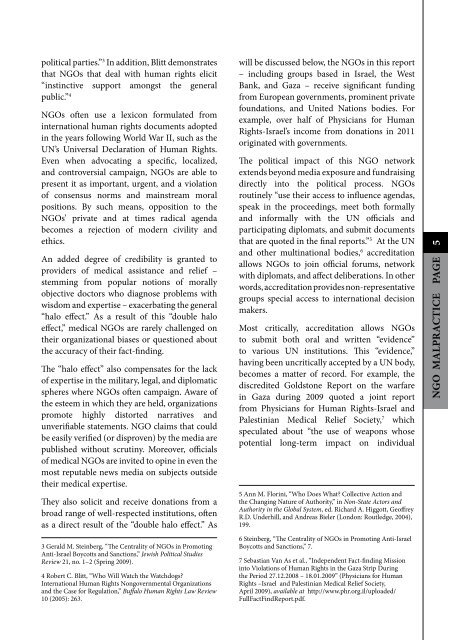NGO Malpractice
NGO_Malpractice
NGO_Malpractice
- No tags were found...
Create successful ePaper yourself
Turn your PDF publications into a flip-book with our unique Google optimized e-Paper software.
political parties.” 3 In addition, Blitt demonstrates<br />
that <strong>NGO</strong>s that deal with human rights elicit<br />
“instinctive support amongst the general<br />
public.” 4<br />
<strong>NGO</strong>s often use a lexicon formulated from<br />
international human rights documents adopted<br />
in the years following World War II, such as the<br />
UN’s Universal Declaration of Human Rights.<br />
Even when advocating a specific, localized,<br />
and controversial campaign, <strong>NGO</strong>s are able to<br />
present it as important, urgent, and a violation<br />
of consensus norms and mainstream moral<br />
positions. By such means, opposition to the<br />
<strong>NGO</strong>s’ private and at times radical agenda<br />
becomes a rejection of modern civility and<br />
ethics.<br />
An added degree of credibility is granted to<br />
providers of medical assistance and relief –<br />
stemming from popular notions of morally<br />
objective doctors who diagnose problems with<br />
wisdom and expertise – exacerbating the general<br />
“halo effect.” As a result of this “double halo<br />
effect,” medical <strong>NGO</strong>s are rarely challenged on<br />
their organizational biases or questioned about<br />
the accuracy of their fact-finding.<br />
The “halo effect” also compensates for the lack<br />
of expertise in the military, legal, and diplomatic<br />
spheres where <strong>NGO</strong>s often campaign. Aware of<br />
the esteem in which they are held, organizations<br />
promote highly distorted narratives and<br />
unverifiable statements. <strong>NGO</strong> claims that could<br />
be easily verified (or disproven) by the media are<br />
published without scrutiny. Moreover, officials<br />
of medical <strong>NGO</strong>s are invited to opine in even the<br />
most reputable news media on subjects outside<br />
their medical expertise.<br />
They also solicit and receive donations from a<br />
broad range of well-respected institutions, often<br />
as a direct result of the “double halo effect.” As<br />
3 Gerald M. Steinberg, “The Centrality of <strong>NGO</strong>s in Promoting<br />
Anti-Israel Boycotts and Sanctions,” Jewish Political Studies<br />
Review 21, no. 1–2 (Spring 2009).<br />
4 Robert C. Blitt, “Who Will Watch the Watchdogs?<br />
International Human Rights Nongovernmental Organizations<br />
and the Case for Regulation,” Buffalo Human Rights Law Review<br />
10 (2005): 263.<br />
will be discussed below, the <strong>NGO</strong>s in this report<br />
– including groups based in Israel, the West<br />
Bank, and Gaza – receive significant funding<br />
from European governments, prominent private<br />
foundations, and United Nations bodies. For<br />
example, over half of Physicians for Human<br />
Rights-Israel’s income from donations in 2011<br />
originated with governments.<br />
The political impact of this <strong>NGO</strong> network<br />
extends beyond media exposure and fundraising<br />
directly into the political process. <strong>NGO</strong>s<br />
routinely “use their access to influence agendas,<br />
speak in the proceedings, meet both formally<br />
and informally with the UN officials and<br />
participating diplomats, and submit documents<br />
that are quoted in the final reports.” 5 At the UN<br />
and other multinational bodies, 6 accreditation<br />
allows <strong>NGO</strong>s to join official forums, network<br />
with diplomats, and affect deliberations. In other<br />
words, accreditation provides non-representative<br />
groups special access to international decision<br />
makers.<br />
Most critically, accreditation allows <strong>NGO</strong>s<br />
to submit both oral and written “evidence”<br />
to various UN institutions. This “evidence,”<br />
having been uncritically accepted by a UN body,<br />
becomes a matter of record. For example, the<br />
discredited Goldstone Report on the warfare<br />
in Gaza during 2009 quoted a joint report<br />
from Physicians for Human Rights-Israel and<br />
Palestinian Medical Relief Society, 7 which<br />
speculated about “the use of weapons whose<br />
potential long-term impact on individual<br />
5 Ann M. Florini, “Who Does What? Collective Action and<br />
the Changing Nature of Authority,” in Non-State Actors and<br />
Authority in the Global System, ed. Richard A. Higgott, Geoffrey<br />
R.D. Underhill, and Andreas Bieler (London: Routledge, 2004),<br />
199.<br />
6 Steinberg, “The Centrality of <strong>NGO</strong>s in Promoting Anti-Israel<br />
Boycotts and Sanctions,” 7.<br />
7 Sebastian Van As et al., “Independent Fact-finding Mission<br />
into Violations of Human Rights in the Gaza Strip During<br />
the Period 27.12.2008 – 18.01.2009” (Physicians for Human<br />
Rights –Israel and Palestinian Medical Relief Society,<br />
April 2009), available at http://www.phr.org.il/uploaded/<br />
FullFactFindReport.pdf.<br />
ngo malpractice page 5


